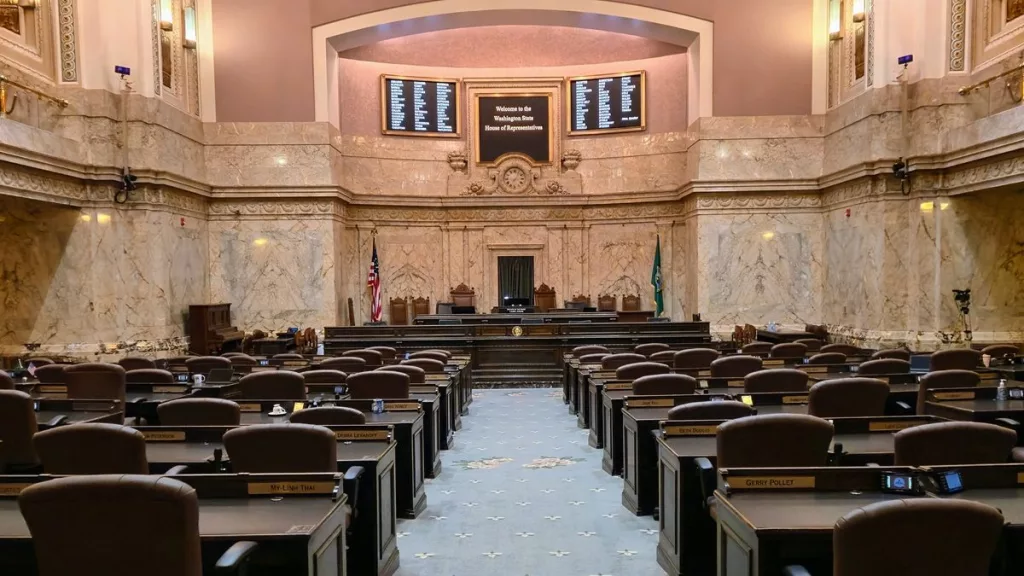OLYMPIA, WA – Legislation meant to implement K-12 savings and efficiencies is scheduled for a public hearing in the Senate Ways & Means Committee on Tuesday afternoon.
House Bill 2050, which adjusts the monthly funding distribution percentages for school districts in the 2025-26 and 2026-27 school years and makes technical updates to local effort assistance funding formulas, passed the House of Representatives on Saturday.
During floor debate on the bill, Rep. Travis Couture, R-Allyn, introduced an amendment that would cap the pay of school district superintendents at $250,000 annually. The amendment ultimately failed, but it did spark a discussion among lawmakers.
“Right now, we have record spending in our schools, and we have terrible outcomes, and it seems like the more money we put into our schools, the worse the outcomes are getting,” Rep. Matt Marshall, R-Eatonville, a member of the House Education Committee and the House Appropriations Committee, told The Center Square on Monday.
While some indicators for Washington students, like school attendance and advanced course completion, have improved, other areas, like test scores and achievement gaps, are showing concerning trends.
According to the Washington State Fiscal Information website, former Chehalis School District Superintendent Dr. Christine Moloney was the highest-paid K-12 employee in Washington state for the 2023-24 school year. The District paid Moloney $545,618 in regular pay and severance during her final year with the district.
Five superintendents for the 2023-24 school year had salaries of $400,000 or more, and dozens of superintendents are listed as having earned $300,000 or more.
“That number [$250,000] was chosen because it is a very livable wage that is on par with many executives and CEOs across the state,” Marshall explained. “That is more money than the Office of the State Superintendent of Public Instruction and more money than the governor of the state of Washington or any other state official. It is a very high salary.”
Marshall said Washington superintendents are insulated from student performance results and in some cases rewarded when school boards sever ties.
“Their severance clause is incredibly beneficial to the superintendents and super harmful to the taxpayer,” he said. “The superintendents now, with their attorneys that are available via their association, are able to … have substandard performance, and the best thing that can happen is they get terminated. If they get terminated and any little, tiny thing in that contract is into a grey area, the culture of our court system is set up so that grey area will benefit the superintendent regardless of who is really at fault.”
Rep. Monica Stonier, D-Vancouver, spoke against Couture’s amendment during floor debate.
“Our school board directors have tough decisions to make,” she said. “They are elected to know whether they are going to hire a superintendent that is known within the community or to open it up to a nationwide search.”
Marshall said opponents of capping superintendents’ salaries claimed Washington needs to compete with other states to find the best candidates, “but when you look at the data, 90% of our superintendents have come up through the Washington state education system; they’re not coming from out of state.”
Rep. Jim Walsh, R-Aberdeen, spoke in support of the amendment.
“Half our kids can’t read at grade level, 70% can’t do math at grade level,” he said. “Are lottery-style payouts the direct cause of those failures? Probably not, but they are synergistic, they are related.”
Marshall told The Center Square that what happened in Chehalis is top of mind for him in protecting local districts.
“In the case of Chehalis, the superintendent got paid out over $300,000, spent less than five months unemployed, and then signed a new contract for $300,000 with a different school district in Washington,” he said.
Last month, Moloney was named the permanent superintendent of Evergreen Public Schools.
“Is it a complex job?” Marshall asked. “Yes. Does it deserve a good salary? Yes. Is it more complex than being the president of the United States, or governor of Washington or Washington state treasurer? I think not.”
Republicans also proposed limiting severance packages to $50,000. Majority party Democrats rejected that amendment as well.
HB 2050 passed the House on a 54 to 40 vote, with four members excused. Three Democrats joined all Republicans in voting against the bill.
Originally published by The Center Square on April 22, 2025. Read the original article at The Center Square.





